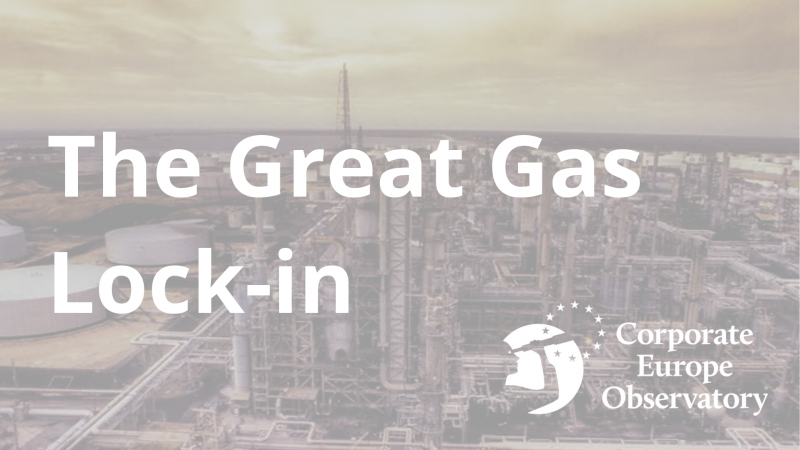
The Great Gas Lock-in
Industry lobbying behind the EU push for new gas infrastructure
A new report by CEO shows why the fire-power of the gas industry makes it a powerful and effective lobbying force in Brussels and national capitals. Meanwhile, public interest groups have just a fraction of the resources and access.
*read the report here* It is also available in French and Spanish.
Industry spent more than €100m in 2016 according to the voluntary transparency register, and deployed over 1000 lobbyists plus an army of PR and lobby consultancies, who helped to organise events in the European Parliament, secure high level meetings with the Climate and Energy Commissioners, follow policy and, among other things, push the myth that gas is a 'clean' fuel to partner renewable energy. Industry proximity to decision-makers and their financial power has seen them capture the agenda, with their own profit motives placed before the interest of the climate and the livelihoods of communities along the supply chain.
European Commissioner for Climate and Energy Miguel Arias Cañete came from an oil and gas background and still has close ties, and alongside Vice-President for the Energy Union Maroš Šefčovič, is driving forward the gas industry agenda at the highest political level with the full collaboration of national leaders. Their plan is to create an integrated EU-wide gas market underpinned by brand new infrastructure. The new envisaged infrastructure, built under the 'Projects of Common Interest' (PCIs) programme, resembles a gas industry wish-list. The industry spin on gas has been swallowed.
Rather than investing in wind, wave, and solar energy and reducing energy use, the EU's security of supply strategy sees yet more pipelines planned to increase gas from Azerbaijan and Algeria (two countries with poor human rights records), as well as multiple others criss-crossing across Europe. An LNG and storage strategy sees yet more infrastructure being built when the current LNG facilities are operating at less than 25 per cent of their total capacity. Europe is being locked into gas well past the middle of the century when we should be moving away from it. Or, if the EU is actually serious about its commitments under the Paris Agreement, the bill for the over-investment in soon-to-be-stranded assets will be borne by taxpayers and ordinary gas customers, not industry. Either way, allowing the gas industry so much influence over our energy decisions is an environmentally, socially and economically destructive folly.
By creating energy policy hand-in-hand with the gas industry, the Commission and national governments ensure the only energy solution on the table is one that chimes with industry profits, i.e. Gas.
Recommendations:
- A moratorium on all new gas infrastructure projects: all gas PCI candidates should be frozen while the list is assessed against plans to stay below a 1.5ºc temperature rise, taking into account the EU's responsibility as a rich historical polluter.
- A transfer of political and financial support: the support currently enjoyed by gas should be put behind wind, solar, wave energy, and energy reduction plans, with a focus on community- and publicly-owned infrastructure and projects, given the failure of the market and the big players to transform our economy and energy system away from fossil fuels.
- An end to the privileged access enjoyed by the gas industry: as with the tobacco industry, industry inclusion in the policy process is severely stunting ambition. A firewall is needed between policy-makers and the fossil fuel industry at the national, regional, and UN level, and the EU needs to stop blocking and support this process.
- Full lobby transparency now: a legally-binding and fully-enforced register is essential to know the true fire-power of industry in Brussels. Transparency is essential but the culture within the European institutions means that even when transparency highlights clear cases of privileged access for industry, such as around revolving doors or expert groups, the political will to fix the problem is lacking. Policy-making in the interest of the public rather than industry will require a fundamental shift in culture in the Commission and across EU capitals.

Comments
Hi, thank you for this report. I'm still learning on the subject so please excuse me if I'm wrong.
When you say "gas is as bad or even worse than coal" for climate change, you're exaggerating, right?
1) Yes, methane is worse than CO2 for the atmosphere. But when you burn methane, you get CO2 and water. Plus, when burning methane, you do get half the CO2 than coal and no additional polluting particles (unlike coal).
2) Methane and natural gas have a higher energy density rate than coal, which means that it's more efficient, because you use less for the same amount of energy. Plus, for heating purposes, gas is a lot more efficient than electricity too.
Granted, leaks seem to be a major problem and should be investigated and tackled asap, but then why not focus on that?
Hi, thanks for the comment. Unfortunately we are not exaggerating. Due to the high warming potency of methane (>100x times more than CO2), it means that leakages from gas extraction, even at rates of 3-4% (which is common), make it as bad as coal. When burnt, yes, it reduces less CO2 than coal, but considering the urgency of climate change, that means we've got no atmospheric space to 'transition' towards gas. It's just not possible, and certainly not when you factor in the methane leakage. Here's a good summary from Professor Robert Howarth, and there are many other useful resources on his website: http://www.eeb.cornell.edu/howarth/summaries_CH4.php